CLAS Faculty Stand Out, With Top Teaching Awards Through The Decades
The Bank of America Award for Teaching Excellence was first presented in 1968 to recognize outstanding faculty members at UNC Charlotte. Through the years, dozens of College of Liberal Arts & Sciences faculty have received the top award, reflecting their commitment to stellar teaching.
It was established in response to a suggestion by the staff of the student literary magazine. Bonnie E. Cone and W. Hugh McEniry, vice chancellors at the time, endorsed the students’ proposal for the annual award and presented it to Chancellor Dean Colvard. He found financial support for the award through the generosity of Addison Reese and NCNB, a predecessor to NationsBank and Bank of America.
Students Study Coral Reefs As Part of Undergraduate Research
The health of the world’s coral reefs garners much media attention, especially related to bleaching and global warming and concerns about chemicals, such as sunscreens and other toxic elements, that could be causing damage to these fragile ecosystems.
Two undergraduate students this summer worked with mentor Amy Ringwood, UNC Charlotte associate professor of biology, to research coral restoration and conservation issues.
UNC Charlotte undergraduate Joel O’Dea performed research with Ringwood in the Caribbean; he was investigating which algal species have a negative or positive effect on the health of corals and their larvae. While in Curacao, O’Dea worked in collaboration with Caribbean Research and Management of Biodiversity and the conservation organization SECORE, as well as staff from Discovery Place Science. His focus was to perform exposure studies on young coral larvae (Diploria labrinthyformis) to different species of algae.
“Determining which species have the most deleterious effects on the larvae, and which ones the corals can compete with, will allow conservationists to create healthier and more successful coral colonies and reef systems,” O’Dea said.
Through a National Science Foundation Research Experience for Undergraduates (REU) award, University of Montana student Cassidy White also conducted research with Ringwood to better understand coral larvae sensitivity. They traveled to the Hawaii Institute of Marine Biology for their studies.
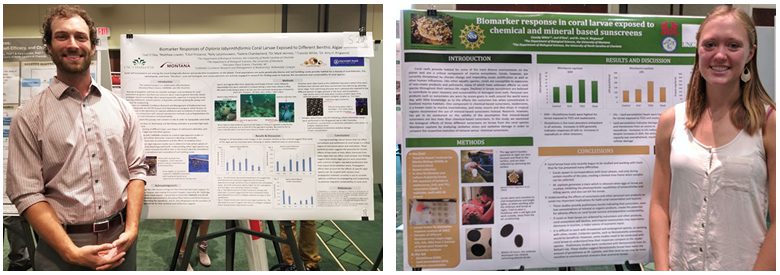
White was in Hawaii during the spawning of the coral species Montipora capitata. She collected fertilized spawn, cultured the larvae and exposed them to three different sunscreens. Two were mineral-based (zinc oxide and titanium oxide) and one was chemical-based (oxybenzone) to determine if certain sunscreens were more ecologically harmful than others. Preliminary data suggested that zinc preparations are the least toxic, but titanium may be almost as toxic as oxybenzone.
O’Dea and White’s projects were timed to take advantage of the limited spawning periods – only a few months out of the year and only for a few days each month, during specific moon phases, Ringwood said.
“Joel and Cassidy were involved in field activities to collect gamete bundles of sperm and eggs that emerged like clockwork from the different species,” she said. She noted this fieldwork required the students to be ready at all hours of the night and day.
Both students characterized their research opportunities as invaluable.
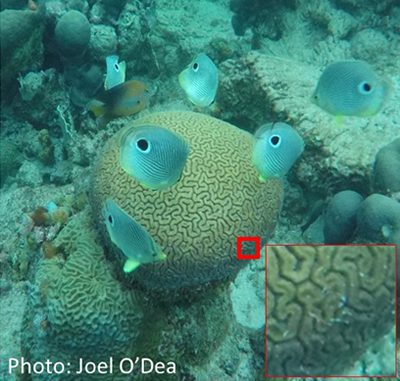 For O’Dea, he was able to travel to the front lines of contemporary marine conservation efforts and work with some of the leading coral biologists. “I’ve been able to learn primarily by doing and communicating with established researchers on a peer-to-peer basis,” he said.
For O’Dea, he was able to travel to the front lines of contemporary marine conservation efforts and work with some of the leading coral biologists. “I’ve been able to learn primarily by doing and communicating with established researchers on a peer-to-peer basis,” he said.
Being able to connect lessons from the classroom to the natural world has “fueled my curiosity and love for learning and the environment,” White said. “This REU experience has prepared me for graduate school more than any other of my undergraduate experiences thus far.”
O’Dea’s Curacao expedition was funded by Discovery Place, and alumnus Elliot Provance (’03), director of living collections and exhibitions at Discovery Place, who earned his biology degree with an ecology emphasis, led the trip. O’Dea also received funding from UNC Charlotte’s Honors College through the Delbridge Narron Alumni Travel Award. The National Science Foundation and the University of Montana Honors College provided support for White’s research.
Images: Courtesy of Ringwood and O’Dea – UNC Charlotte Honors Student Joel O’Dea and Elliot Provance, Director of Discovery Place Live Collections, underwater; O’Dea and White present their research at a summer research symposium; coral head surrounded by butterfly fish.
Mathematician Studies Dynamical Systems to Find Practical Solutions
Mathematical equations cycle through Kevin McGoff’s mind, as he pedals his bike on the system of greenways in north Charlotte.
The UNC Charlotte mathematician’s thoughts shift into gear, centered on problems associated with his field of study – dynamical systems. Dynamical systems serve as important mathematical models for a wide array of physical phenomena, relating to things such as weather modeling, systems biology, the spread of disease, and statistical physics, for example.
In mathematical terms, such a system consists of a state space, in which a point represents a complete description of the system, and a rule governing the evolution of the system from one state to another. These basically are units whose state evolves over time according to a kind of logic or rule.
On this day on the greenway, the verdant greenery that envelops McGoff, the ground beneath him, and the air he breathes, are all parts of a massive dynamical system – the Earth itself. In McGoff’s case, curiosity about Earth as a system was the original spark for what has grown into a research focus with implications for disease and other societal issues.
In one area of research, McGoff collaborates with epidemiologists who are studying the spread of diseases in populations and the dynamical effects that come into play within organisms. He currently is working with biologists to study malaria, work that grew from seeing system similarities through work with dynamical systems associated with circadian rhythms.
“You have these parasites that get into your body, and they essentially overwhelm your immune system in a dynamic way,” he says. “They all burst out of their cells at the same time, and then they swarm your immune system, and that’s when you get these spiking high fevers. That happens periodically.”
Researchers nee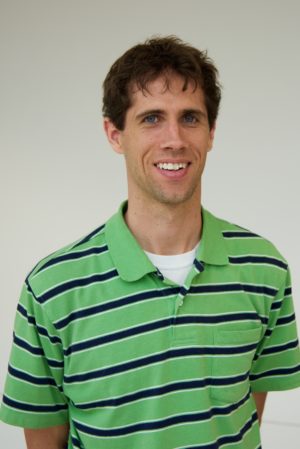 d to understand how this happens. “There must be some underlying dynamical system which tells them when to burst out.,” McGoff says. “If we can now study these parasites through observations of their genetic behavior over time – dynamic signatures of their genetics – the hope would be that we could understand what program is encoded in their DNA that allows them to coordinate their behavior. Of course, if we can understand what’s making them work, then the next step is how to break it.”
d to understand how this happens. “There must be some underlying dynamical system which tells them when to burst out.,” McGoff says. “If we can now study these parasites through observations of their genetic behavior over time – dynamic signatures of their genetics – the hope would be that we could understand what program is encoded in their DNA that allows them to coordinate their behavior. Of course, if we can understand what’s making them work, then the next step is how to break it.”
McGoff and colleagues have published in journals including Genome Biology, The Annals of Probability, and The Annals of Statistics and other publications. He continues to explore the theoretical side of dynamical systems, while he also collaborates on practical applications. Both have a place in research in this field, he says.
“Beginning with concrete examples of systems and then abstracting the relevant properties is often a good way to find interesting theoretical questions for further study,” he says.
McGoff has received National Science Foundation funding to focus on characterizing when traditional statistical procedures may be effectively applied in the context of dynamical systems.
“Imagine that you’re a scientist, and you want to understand the way a certain system works,” McGoff says. “You might have some form of equations that you think makes sense, but you want to know what exact parameters should I choose for this, or at a bigger level, what form of equations should I even select as a model for my data?”
In many cases, the underlying models that people try to use are dynamical systems. “This effort brings my knowledge of dynamical systems to bear on these statistical inference problems, going from observations of a system and trying to reconstruct the model,” he says. “So, how do you use the information you get from your observations in an intelligent way to understand the underlying dynamical system?”
In one discovery, McGoff has found a way to describe what he calls a random dynamical system.
“You basically have a big bag of dynamical systems,” he says. “And, a lot of what has been done in the past has been to pick one out specifically and look very carefully at it and understand how it works. One approach I looked at in specific cases was to select one at random and ask, “What does that one look like?” This helps to characterize what typical systems do, which can have more relevance for the real world. If you looked out into the world, what behavior would you expect to see? You would expect to see typical behavior. But, what is that? You need some way of choosing a system at random and then asking what it does.”
As McGoff works with undergraduate and graduate students, he reminds them of the need to continue to take varying views of problems and to consider things for different perspectives.
“Always take a different approach,” he says. “When an approach works, it just flows. An idea can come at a completely random time, like the shower in the morning or on a bike ride. When you have an idea, and the consequences just start flowing, and when you get that cascading effect of ideas, you know you’re onto something.”
Words and Images: Lynn Roberson, CLAS Communications Director | Illustration: Ashley Plyler, CLAS Graphic Designer
Observatory Director Brings Historic Solar Eclipse Into Focus
By now you’ve probably heard that a total solar eclipse is coming to North American skies on Monday, Aug. 21, 2017, and the Carolinas have a front row seat. UNC Charlotte Observatory director and astrophysicist Catherine Qualtrough of the College of Liberal Arts & Sciences shares the basics of this historic event.
What is a solar eclipse?
A solar eclipse occurs when the moon passes between Earth and the sun, blocking out all (total eclipse) or part (partial eclipse) of the sun’s light. In a quirk of celestial geometry, even though the moon is 400 times smaller than the sun it is 400 times closer to Earth. This lucky fact means the two bodies appear almost the same size in the sky. So, when the alignment is just right the moon can completely cover the disc of the sun, and for those in the path of the moon’s shadow, the sun will go dark.
How often does this happen?
The moon orbits the Earth once a month, but total solar eclipses are actually much rarer because the moon doesn’t orbit in the same plane as the Earth and sun. On average, a total eclipse is visible somewhere on Earth about every 18 months, but for any one location there may be hundreds of years in between. The August eclipse will be the first total solar eclipse visible across the entire United States in 99 years, and we won’t see another on U.S. soil until 2024. For North Carolina, we’ll wait until 2078 for the next total eclipse.
What is the “path of totality?”
While everyone in the continental United States will see at least a partial eclipse on Aug. 21, the best experience will be in the “path of totality,” a 70-mile-wide ribbon of land lying under the moon’s darkest shadow (the “umbra”). Charlotte itself will experience a 98 percent partial view of the eclipse starting at 1:05 p.m. and ending around 4 p.m. with a peak at 2:41 p.m.
What will I see?
 Veteran “eclipse-chasers” describe a moving and jaw-dropping experience during totality – the almost 2 minute 30 second period in which the moon completely covers the sun in the sky. Viewers can expect a sky as dark as night with planets and stars popping into view, temperatures dropping as much as 10-15 degrees Fahrenheit and a rare and magical view of the sun’s wispy outer layer, the corona, dancing outside the inky black outline of the moon.
Veteran “eclipse-chasers” describe a moving and jaw-dropping experience during totality – the almost 2 minute 30 second period in which the moon completely covers the sun in the sky. Viewers can expect a sky as dark as night with planets and stars popping into view, temperatures dropping as much as 10-15 degrees Fahrenheit and a rare and magical view of the sun’s wispy outer layer, the corona, dancing outside the inky black outline of the moon.
Although the view in Charlotte will be less dramatic, it is still not to be missed. Expect it to feel like an eerie dusk in the afternoon with bright Venus and Jupiter visible at the peak.
This eclipse simulator shows you what the eclipse will look like near your location.
How can I view the eclipse safely?
Your parents may have warned you never to look directly at the sun, and they were right (again). The good news is you don’t need a telescope or fancy equipment to be safe. Eclipse glasses, which are available online and at local retailers like Lowe’s, offer a safe, filtered view. While it is safe to remove your eclipse glasses during the brief period of totality during a full eclipse, glasses should never be removed during a partial eclipse (like in Charlotte). For more important eye safety information, visit the NASA eclipse website.
Travel problems
While it’s tempting to think of driving to the path of totality, experts warn of traffic gridlock. With 1 million visitors expected in Columbia, South Carolina alone and accommodations booked out for months, last-minute trips are not recommended.
Happy Viewing!
For most, a total eclipse is a once in a lifetime experience. And sadly, for our distant descendants, as the moon is drifting slowly away from the Earth (at the rate of 1.5 inches a year) these events won’t happen forever. In about 600 million years, Earth will experience the drama of a total solar eclipse for the very last time.
For more information on eclipse viewing tips and future astronomical events, contact Catherine Qualtrough at the UNC Charlotte Observatory. Hear more on this WCNC report.
Pictured: NASA map showing the eclipse path. Second image: the sun’s corona, helmet streamers, prominences, polar flumes, and coronal loops can be seen in this total solar eclipse photo. Photo courtesy of S. Habbal, M. Druckmuller, and P. Aniol, NASA.
Botanical Gardens Director Speaks to the Power of Growth
For 50 years, the UNC Charlotte Botanical Gardens has been a living classroom for students and a horticultural and botanical asset for the campus and greater community. Botanical Gardens Director Jeff Gillman describes how support through Exponential will sustain the future of the gardens, including its educational curriculum and ongoing research. Plans call for building a new welcome center that will serve as a gateway to the green heart of UNC Charlotte’s campus. This sustainable facility will draw students,faculty, staff and the public to an open and inviting teaching facility, working greenhouse and surrounding plaza, all designed to serve generations to come.
Army Veteran Pursues Mathematical Finance Master’s Degree
Former Army finance specialist Tyler Crone served in Afghanistan and later taught high school computer science. Now, Crone is earning his master’s degree in Mathematical Finance, confident that this will be the gateway to a challenging career.
The nationally ranked Mathematical Finance program is a joint program of the Departments of Finance and Economics in the Belk College of Business and the Department of Mathematics and Statistics in the College of Liberal Arts & Sciences. Students take courses from all three departments in an integrated curriculum and may use electives to tailor the program to their specific interests.
Biology Alum Brews Up Creativity With Science Degree
College of Liberal Arts & Sciences alum Dave Martin is using his biology degree creatively at Olde Mecklenburg Brewery – blending science and art! Martin (’10) is the director of brewing operations at The Olde Mecklenburg Brewery in Charlotte.
CLAS Undergraduates Win Honors at Summer Research Symposium
More than 100 undergraduate students competed in the 2017 Summer Research Symposium, with three College of Liberal Arts & Sciences students named the winners.
The Charlotte Research Scholars initiative presented the July 26 symposium, which included CRS students and undergraduates from other Research for Undergraduate Students programs held this summer at UNC Charlotte. These are:
- Summer Program to Increase Diversity in Undergraduate Research
- NanoSURE REU Program
- Biology and Biotechnology REU Program
- Crime Analytics REU Program
- Mechanical Engineering Summer Research Program
- Charlotte Community Scholars Program
The July 26 symposium is an integral element of the students’ summer research experiences at UNC Charlotte, as they hone their research communication skills. While most of the students in these programs are UNC Charlotte scholars, these competitive programs also include students from other universities in the region and from across the nation.
Each participant worked closely with a mentor or mentors this summer, conducting research either individually or as part of a small student team. During the symposium, the students had three minutes to present the research they had summarized and illustrated on a poster. They responded to judges’ questions and also described their work to curious university faculty and staff and community members who came to the event in the Barnhardt Student Activity Center salons.
“These are extremely bright students, and this has all the atmosphere, excitement and tension of an athletic event,” said Nathaniel Fried, Charlotte Research Scholars Program director and professor in the Department of Physics and Optical Science. “Even the more than 50 judges, who are highly qualified volunteers from among faculty and administrators, sense and share the anxiety.”
Using the past as a predictor of the future, at least some of the students are expected to continue their research, presenting findings at conferences and publishing their work in academic journals or conference proceedings.
“Intensive research such as these students have conducted is not ordinarily associated with undergraduate education,” said keynote speaker Pinku Mukherjee, chair of the Department of Biological Sciences and the Irwin Belk Distinguished Professor of Cancer Research.
“These students are preparing to pursue graduate education, which is defined by its focus on honing research skills and creating knowledge,” Mukherjee said. “These are the agile minds that will advance understanding in many areas that affect our lives.”
Winners Address Complex Issues
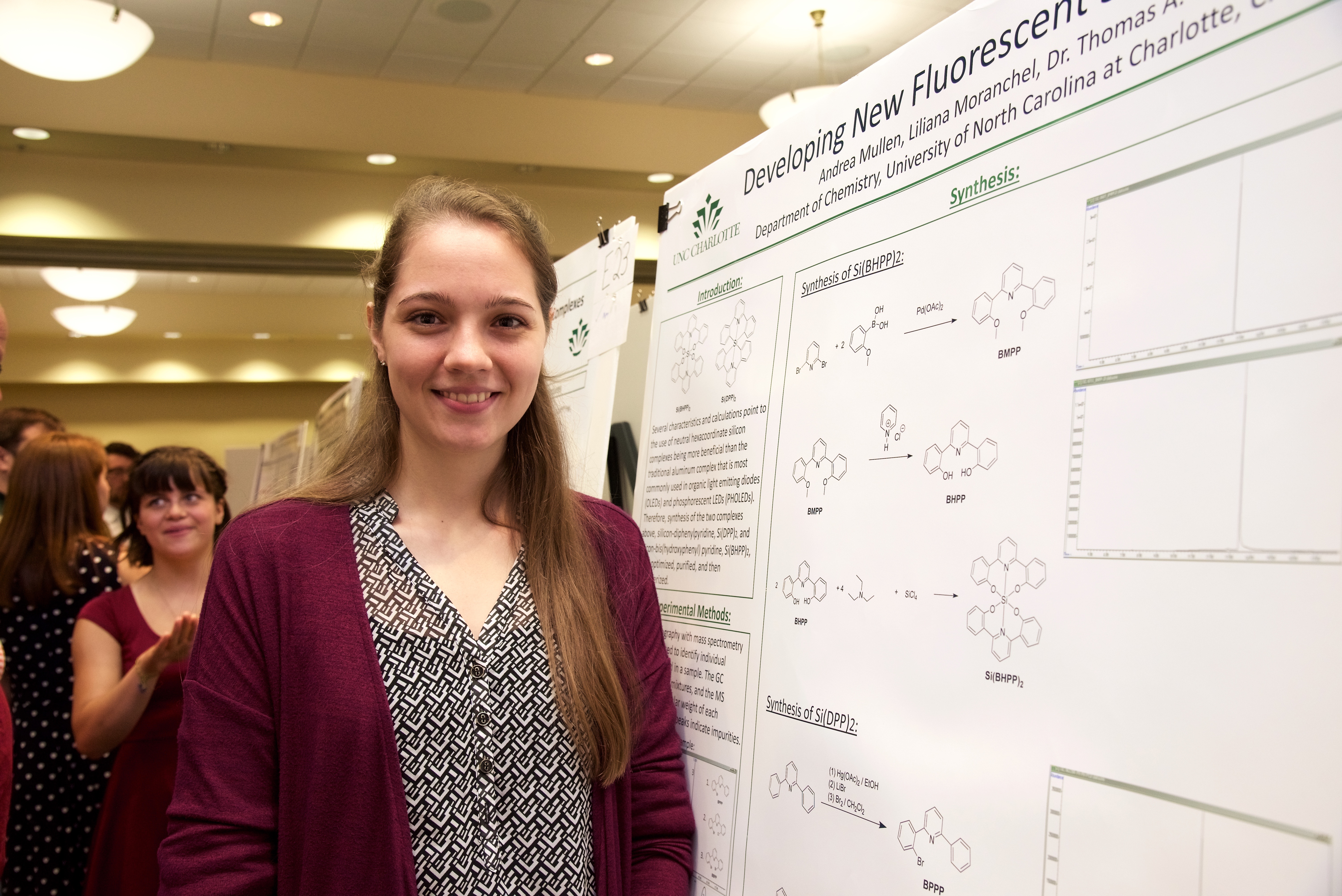 In the category “Engineering, Physical Sciences, Nanotechnology and Computing,” chemistry major Andrea Mullen placed first for “Developing New Fluorescent Silicon Complexes.” She is a participant in the NanoSURE Research Experiences for Undergraduates Program. Second place went to Deep Ghaghara for “Better Object Detection at No Extra Cost,” and Cobey McGinnis took third place for “Microspherical Nanoscopy: Perfecting Quantification of Resolution.”
In the category “Engineering, Physical Sciences, Nanotechnology and Computing,” chemistry major Andrea Mullen placed first for “Developing New Fluorescent Silicon Complexes.” She is a participant in the NanoSURE Research Experiences for Undergraduates Program. Second place went to Deep Ghaghara for “Better Object Detection at No Extra Cost,” and Cobey McGinnis took third place for “Microspherical Nanoscopy: Perfecting Quantification of Resolution.”
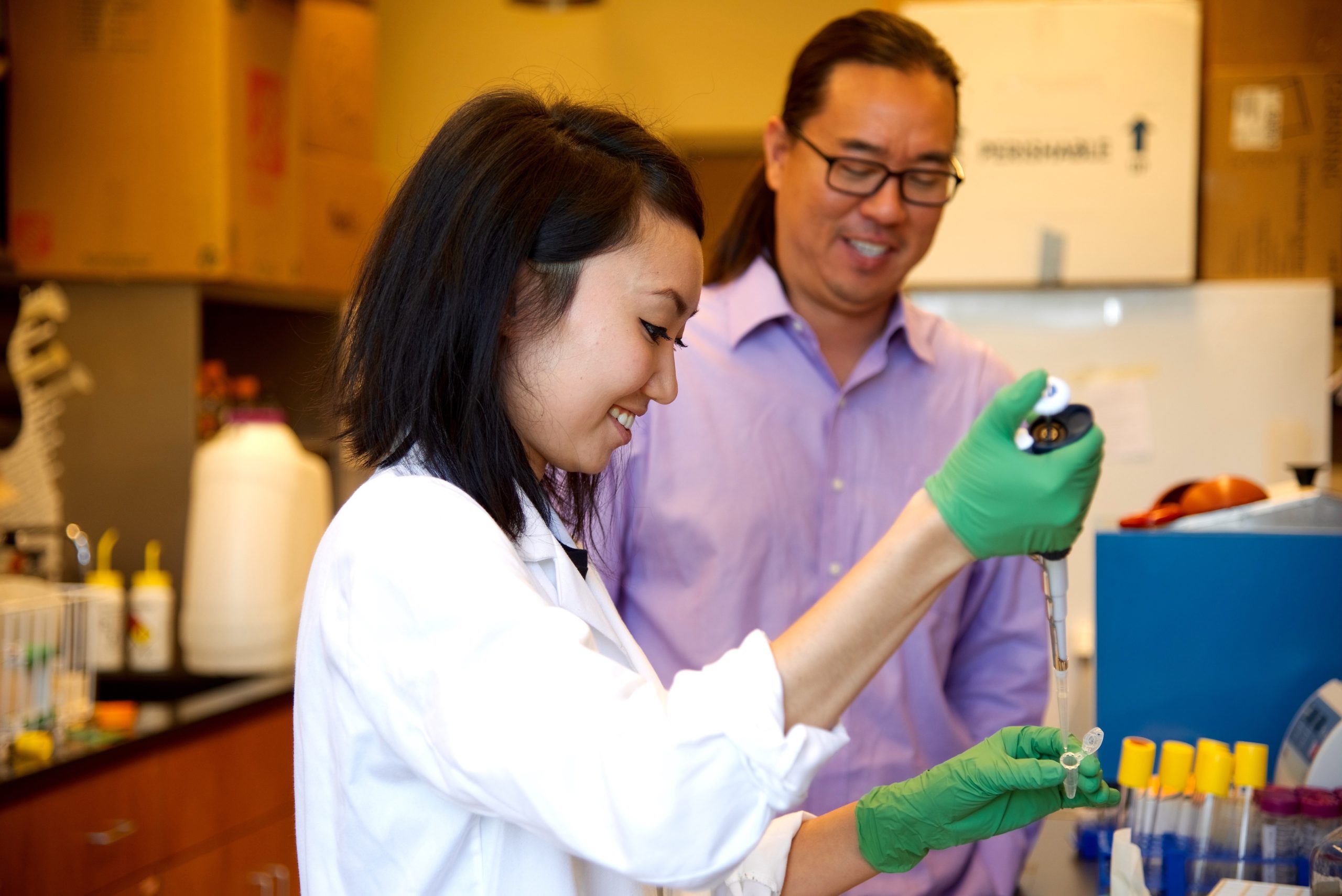 For the category “Biomedical, Biological Sciences and Public Health,” biology major Elvira An placed first for “Identifying Cancer Drug Targets Using a Novel Yeast Small Compound Screen.” She is a participant in the Biology and Biotechnology Undergraduate Research Experience Program. Matthew Kustra took second place for “Toxin Expression and Effects on Predator and Prey in Two Model Sea Anemone Species,” and the third-place winner was Austin Paytes for “Optimization of DNA Extraction Protocols for the Analysis of the Environmental Microbiome”
For the category “Biomedical, Biological Sciences and Public Health,” biology major Elvira An placed first for “Identifying Cancer Drug Targets Using a Novel Yeast Small Compound Screen.” She is a participant in the Biology and Biotechnology Undergraduate Research Experience Program. Matthew Kustra took second place for “Toxin Expression and Effects on Predator and Prey in Two Model Sea Anemone Species,” and the third-place winner was Austin Paytes for “Optimization of DNA Extraction Protocols for the Analysis of the Environmental Microbiome”
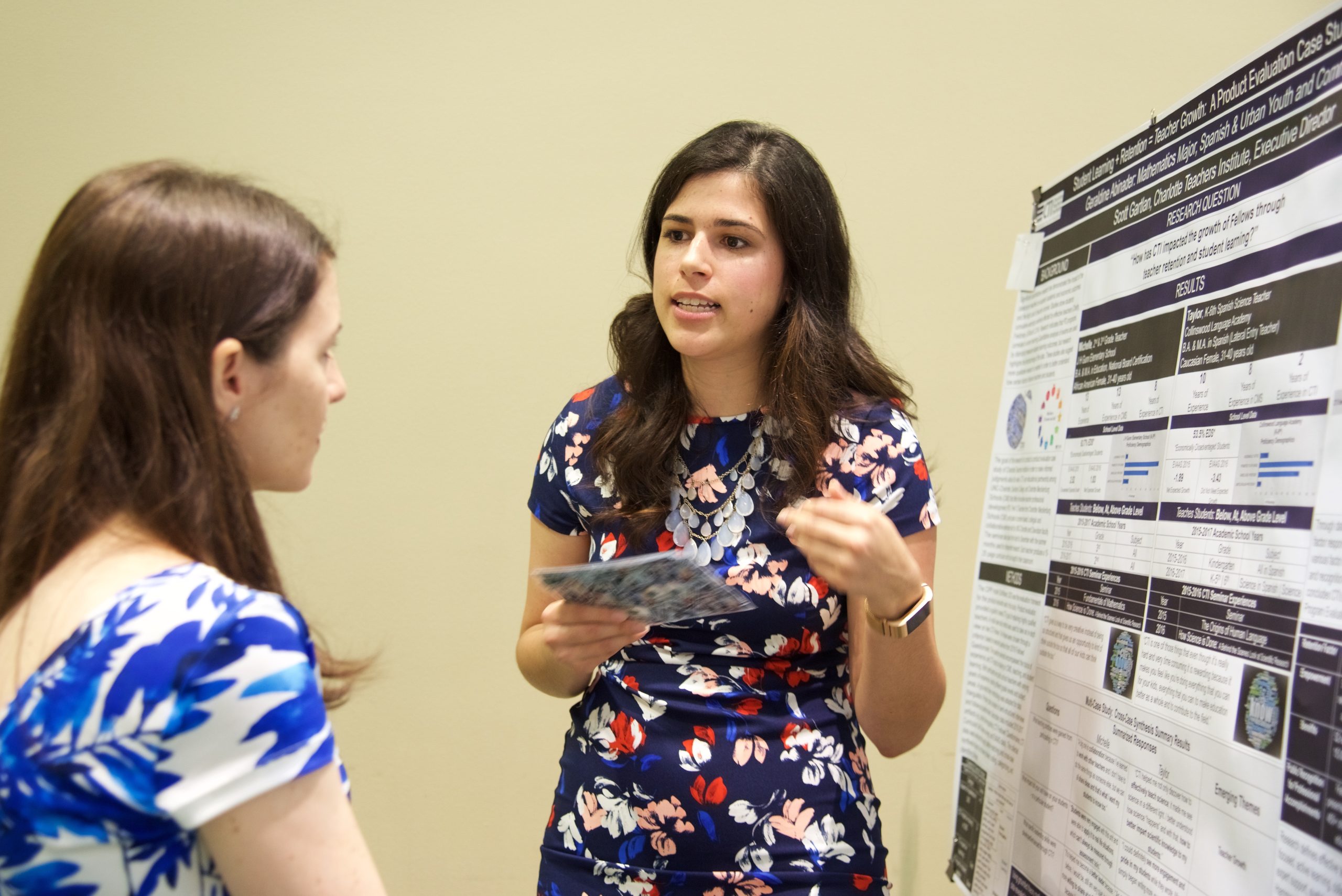 In the “Humanities, Social Sciences, Education, Business and the Arts” category, Charlotte Community Scholars Program participant Geraldine Abinader received first place for “Student Learning + Retention = Teacher Growth: A Product Evaluation Case Study among CTI Fellows.” Abinader is a mathematics major and Spanish and Urban Youth and Communities minor. Second place went to Jessica Prince for “Examining the Influence of Meaning-Making on the Association Between Stress and Positive Mental Health in African American College Students.” Hannah Hardy placed third for “Development Screenings for Publicly-funded Pre-kindergarten: Comparing Children Experiencing Homelessness and their Stably-housed Peers.”
In the “Humanities, Social Sciences, Education, Business and the Arts” category, Charlotte Community Scholars Program participant Geraldine Abinader received first place for “Student Learning + Retention = Teacher Growth: A Product Evaluation Case Study among CTI Fellows.” Abinader is a mathematics major and Spanish and Urban Youth and Communities minor. Second place went to Jessica Prince for “Examining the Influence of Meaning-Making on the Association Between Stress and Positive Mental Health in African American College Students.” Hannah Hardy placed third for “Development Screenings for Publicly-funded Pre-kindergarten: Comparing Children Experiencing Homelessness and their Stably-housed Peers.”
The Charlotte Research Scholars Program is a summer program begun in 2012 for high-achieving undergraduate students to gain experience in research and professional development in their field of interest. Such opportunities are not typically available in the undergraduate classroom. In addition to mentored research activities, scholars participate in weekly professional development training to build skills critical to professional success.
Images: Lynn Roberson, CLAS Communications Director
UNC Charlotte Botanical Gardens Cultivate Creative Class Setting
Tree-lined trails spider through the glen. An emerald canopy blocks the cloudy sky from view. As visitors walk through the fresh blooms of the pink and white azaleas, a subtle fragrance lingers. Birds sing to one another as water murmurs in moss-lined rocky streams, and a warm breeze rustles the leaves. The hushed whispers of UNC Charlotte students add another note to the song in the UNC Charlotte Botanical Gardens.
On this day, the students are scholars in Allison Hutchcraft’s Intermediate Poetry class. Hutchcraft, an English lecturer and lover of the Botanical Gardens, has taken her class outside to embrace nature and to gain inspiration from the natural world.
“In my Intermediate Poetry class last spring,” she says, “we read two collections of poetry that looked to gardening and the natural world – Catalog of Unabashed Gratitude by Ross Gay and Lucky Fish by Aimee Nezhukumatathil – and then visited the Gardens to explore how we, too, can integrate the natural world into our creative work.”
Students adore this, as judged by their expressions and discussions. They sit on abandoned benches, tree trunks and bridges and soak in the natural atmosphere around them.
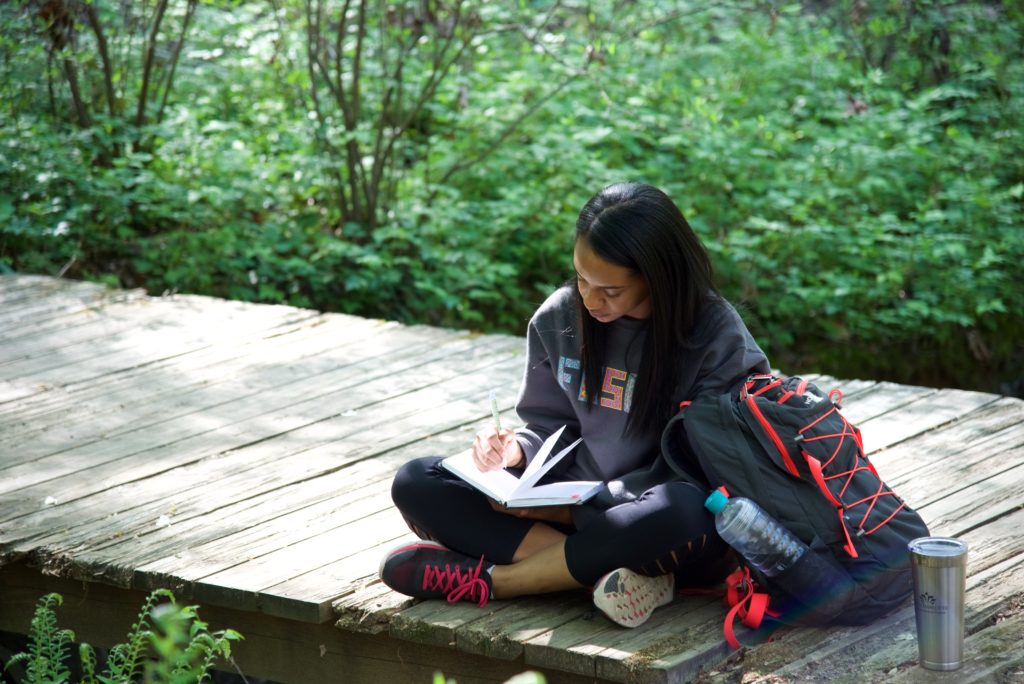 Hutchcraft is among the faculty who turn to the alluring Botanical Gardens. Dave Brodeur, who teaches graphic design in the College of Arts + Architecture; Jamie Strickland of Geography & Earth Sciences; Aaron Kampe of Biological Sciences; Susanne Gomoluch of Languages and Culture Studies; and others are sharing time in the Botanical Gardens with their students, studying subjects ranging from graphic design to ecological interactions.
Hutchcraft is among the faculty who turn to the alluring Botanical Gardens. Dave Brodeur, who teaches graphic design in the College of Arts + Architecture; Jamie Strickland of Geography & Earth Sciences; Aaron Kampe of Biological Sciences; Susanne Gomoluch of Languages and Culture Studies; and others are sharing time in the Botanical Gardens with their students, studying subjects ranging from graphic design to ecological interactions.
Assistant professor of English Matthew Rowney incorporates the Botanical Gardens bounty into his teaching by comparing the setting to those found in Wordsworth’s The Prelude. With his class, he takes a historical approach by contrasting the landscapes of 18th century China and Britain with these modern gardens. He uses the Botanical Gardens as an example of the differences, considering the versions of nature and landscape aesthetics found in the UNC Charlotte setting and drawn from the pages of the famous literary work.
“I am hoping to complicate the simple idea of enjoying nature by thinking about these historical developments that have shaped what the natural world actually is,” Rowney says. “I think we should try to be critical about what it means to look at nature. How can that be problematic, especially when that nature has been set up to look a certain way and it’s not something just simply found? What are some of the complications that arise when thinking about what it means to have an experience with the natural world?”
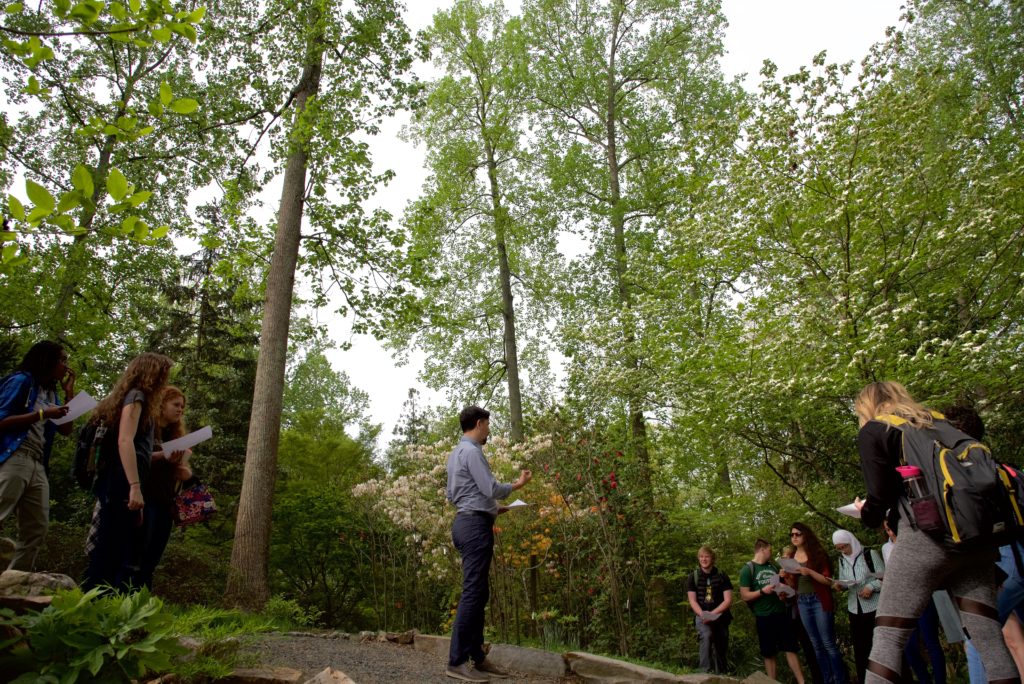 These questions perhaps have his students thinking more deeply and with more complexity than they would in a traditional classroom setting, as if the open natural space creates openness in their minds.
These questions perhaps have his students thinking more deeply and with more complexity than they would in a traditional classroom setting, as if the open natural space creates openness in their minds.
“The Gardens help bring to life some of the aspects that the poem is dealing with and the class is dealing with more broadly,” Rowney says of this semester’s work. “I think that often we get so used to dealing with texts in the same way, that we forget that we’re actually talking about the real world out there. Going to the Gardens gives us opportunity to provide another way of thinking about the subject matter and to give a broader perspective on some of the issues involved in the course.”
Words: Heather Benson, Student Communications Assistant | Images: Lynn Roberson, College Communications Director | Pictured (from top) Matthew Rowney (r) with class; student in Allison Hutchcraft’s class reflects through her writing; Rowney’s class discusses Wordsworth’s The Prelude.
Exceptional Faculty Receive College 2017 Teaching Excellence Awards
In recognition of their exceptional teaching, Ashley Bryan, Nishi Bryska and Ian Marriott have received the College of Liberal Arts & Sciences’ Excellence in Teaching Awards for 2017.
Bryan, a faculty member in the Department of Religious Studies, has received the Outstanding Teaching by a Part-Time Faculty Member Award. Bryska, a faculty member in the Department of Biological Sciences, has received the Outstanding Teaching by a Full-Time Lecturer Award. Marriott, a faculty member in the Department of Biological Sciences, has received the Integration of Undergraduate Teaching and Research Award.
They, along with finalists for the teaching awards, were honored at a college reception on April 24. Dean Nancy A. Gutierrez and the awards committee chairs commended the honorees for their innovation, creativity and focus on engaging students in scholarship and research.
The finalists for the Outstanding Teaching by a Part-Time Faculty Member Award were Valerie Bright of English and Jeanne-Marie Linker of Mathematics & Statistics.
The finalists for the Outstanding Teaching by a Full-Time Lecturer Award were Hannah Peach of Psychological Sciences and Wafaa Shaban of Mathematics & Statistics.
The finalists for the Integration of Undergraduate Teaching and Research Award were Jennifer Munroe of English and Stephanie Norander of Communication Studies.
The Winners Are:
Ashley Bryan
Ashley Bryan is a part-time faculty member in the Department of Religious Studies. After graduating from Temple University with a bachelor’s degree with a concentration in religion and philosophy in a global context, she worked at a small business in Charlotte in the technology sector. She credits her liberal arts degree and her knowledge of international cultures as the reasons for gaining this employment. Later, Bryan entered the master’s degree program in religious studies at UNC Charlotte, where she was a graduate teaching assistant. She joined the faculty at UNC Charlotte in 2013.
“All of my classes are designed so that students can truly be self-directed learners within the parameters set forth in the class,” Bryan says. “Even though I give students very instructive advice related to proven methods that can help structure their own success, I recognize that each student is an individual with their own study methods, external obligations, internal struggles, and personal preferences.”
Bryan has developed innovative courses in Religious Studies, and students return to study with her repeatedly. Her teaching evaluations from students demonstrate that she is a faculty member who is thoughtful, challenging, and interested in the intellectual well-being of students at the university.
“Though many former students liken me to a mentor, I firmly maintain that I am only a supporting actor; it is the curiosity and imagination contained within the students themselves and the liberal arts ethos of ongoing self-driven education that enables students to effect change in their lives and the world around them,” she says.
Nishi Bryska
As a senior lecturer in the Department of Biological Sciences, Nishi Bryska has contributed to the human anatomy and physiology lecture and laboratory instruction offered by both Biological Sciences and, at one period of time, Kinesiology. She has also helped develop the curriculum for the Animal Physiology Laboratory and two new liberal studies courses. She advises biology majors and students seeking professional degrees in allied health fields.
Her teaching philosophy is focused on promoting positive learning experiences, sparking an enthusiasm for learning, and providing strong foundations for lifelong learning.
“I think learning should be stimulating and exciting,” Bryska says. “I try to have the students think of a difficult concept as if it is a mystery novel. There is a beginning and an ending. I want them to be excited about arriving at the end.”
Over the years, Bryska has used different methods of teaching, and she finds it exhilarating to actively involve students in learning.
Her course material is presented in a variety of ways that include lectures, demonstrations, in-class problem solving sessions, group work, and even role playing where she has selected students pretend to be amino acid units in order to demonstrate how a protein structure forms or the molecular structure of muscles. A former student states that she is a “really excellent professor who taught professionally and uses a variety of methods to help students understand.”
Her future plans are to incorporate inquiry-based learning in her courses, by which students would practice problem-solving and critical-thinking skills to arrive at the appropriate conclusions.
Ian Marriott
Ian Marriott, professor of biological sciences, is a prolific researcher in immunology and biotechnology, and he has an extensive record of both integrating undergraduate students in his own scholarly research and integrating undergraduates’ research into his classroom and research practices.
He has co-authored eight peer-reviewed articles and numerous conference presentations with undergraduates, including some in which the student was the first author. He routinely designs classroom activities that facilitate student designed-and-conducted research.
In addition to an impressive record of funded research of his own, Marriott is the co-principal investigator on a $70,000 award from the North Carolina Biotechnology Center that funded the purchase of new equipment to support two practical, hands-on, undergraduate courses that focus on the application of current biotechnology and immunological techniques. He developed these courses with colleague Kenneth Bost.
In his research-intensive classes, he integrates material from his federally funded biomedical research program. “Undergraduate students in these courses are encouraged to actively participate in the design, performance, and interpretation of the results, of such experiments,” he says. “It is only in this setting that students can begin to appreciate the complexity of the interaction between our bodies and bacterial and viral pathogens and, importantly, recognize the limits of our current understanding of disease processes.”
Students and alumni say Marriott excels at creating a classroom environment where they feel safe and supported as they assume intellectual risks they find are key to scientific discovery and scholarly innovation.
Award Finalists Are:
Valerie Bright
Valerie Bright is a part-time faculty member in the Department of English. She earned her undergraduate and graduate degrees in English from UNC Charlotte and regularly teaches two of the core liberal studies courses the English Department offers for the General Education Program as well as core courses in the area of children’s literature.
Bright says she believes that learning is an internal process and that students learn more when they are interested and engaged. When she approaches a course, her goal is to help students improve their active listening, develop critical thinking skills, appreciate and champion diversity, gain confidence, and import the idea that learning can be enjoyable.
She not only wants her students to leave the classroom with more information about the subject matter, but she also wants them to have grown as an individual. Students frequently comment on her high energy, her enthusiasm for the course material, and her creativity in the classroom. It is her hope that through connecting with her students and allowing them to explore their own ideas in writing, conversation, and assignments, they will be encouraged to pursue knowledge.
Jeanne-Marie Linker
Jeanne-Marie Linker is a part-time lecturer in the Department of Mathematics and Statistics. She earned her master’s degree in pure mathematics from Texas State University, after receiving her undergraduate degrees in biology and chemistry from UNC Charlotte.
She believes that every student of mathematics is entitled to instruction that is clear, accurate, and thorough. Her goal as an instructor is to instill in her students the joy she finds in mathematics and logical problem solving, with her classroom serving as a place for creativity, discovery, and growth.
“My firm belief that any student, even the most woefully underprepared, can improve their mathematical ability significantly over the course of a semester, is a powerful motivator for me as a teacher of mathematics,” she says. “I am enthusiastic not only about the subject matter, but also about the potential of my classes to have a real impact on student success.”
Hannah Peach
Hannah Peach has taught a variety of courses in the Department of Psychological Sciences, ranging from General Psychology to Research Methods I and II to the Undergraduate Teaching and Research Assistantship courses as well as co-instructor for a couple of doctoral level courses. She has also mentored numerous undergraduate research students.
Peach incorporates examples, demonstrations, and “learn by doing” assignments and activities into her lectures to help students deepen and apply the content knowledge of the course.
Peach says she values a classroom environment that is interactive and encourages critical thinking. Her approach encourages teamwork and exposes students to diverse perspectives, facilitating the building of relationships with peers from a variety of backgrounds.
Wafaa Shaban
Wafaa Shaban is a senior lecturer in the Department of Mathematics and Statistics. Her teaching career began as an elementary school math teacher, and later moved o the middle school, high school, and college levels. She teaches a variety of mathematics and statistics courses in the department and also directs the Actuarial program, a program she established at UNC Charlotte. She advises the Math Club, the Pi Mu Epsilon Math Honors Club, and the Actuarial Science Club.
Shaban shows that she understands that a requirement for being a successful teacher is learning new material and then delivering that material effectively to students. Early in her career, her exposure to Actuarial Science was new. Along with six students, she worked to learn more about the field and to prepare the students for the Actuarial exams. Since then, she has immersed herself in the field and has passed the exams necessary to gain the “Associate” designation within the Society of Actuaries.
“Shaban works tirelessly to help her students get all the academic and career resources they need,” a former student says. “She makes every student feel like they are able to achieve so much more than they believe they can.”
Jennifer Munroe
Jennifer Munroe, associate professor of English, develops pioneering digital humanities tools to study Shakespeare and Early Modern English Literature. Munroe treats her undergraduate students as genuine collaborators.
Through both classroom activities and independent research, undergraduate students have been key contributors to several projects, including her edited volume Ecofeminist Approaches to Early Modernity, and her latest digital humanities project, the Early Modern Recipes Online Collective (EMROC). This project digitizes centuries-old recipes and makes them widely available in a database.
Her students are also conducting original archival work that contributes to scholarly and public knowledge, and they are practicing concrete skills that they can use in graduate school or nonacademic careers.
Stephanie Norander
Stephanie Norander is associate professor of Communication Studies and executive director of the Communication Across the Curriculum program. She excels at incorporating original, applied research activities into her classes.
Her Advanced Topics in Organizational Communication class conducted a focus group study on the UNC Charlotte University Professional Internship Program, for example. Students conducted all aspects of the research, including applying to an external agency to fund the project.
These applied research projects let students directly practice the exact skills and processes that they will use in the field. Norander also mentors students outside the classroom, including independent research projects that have been accepted to professional conferences, and co-authored publication.
Pictured: Ian Marriott, Ashley Bryan, Nishi Bryska, Nancy Gutierrez